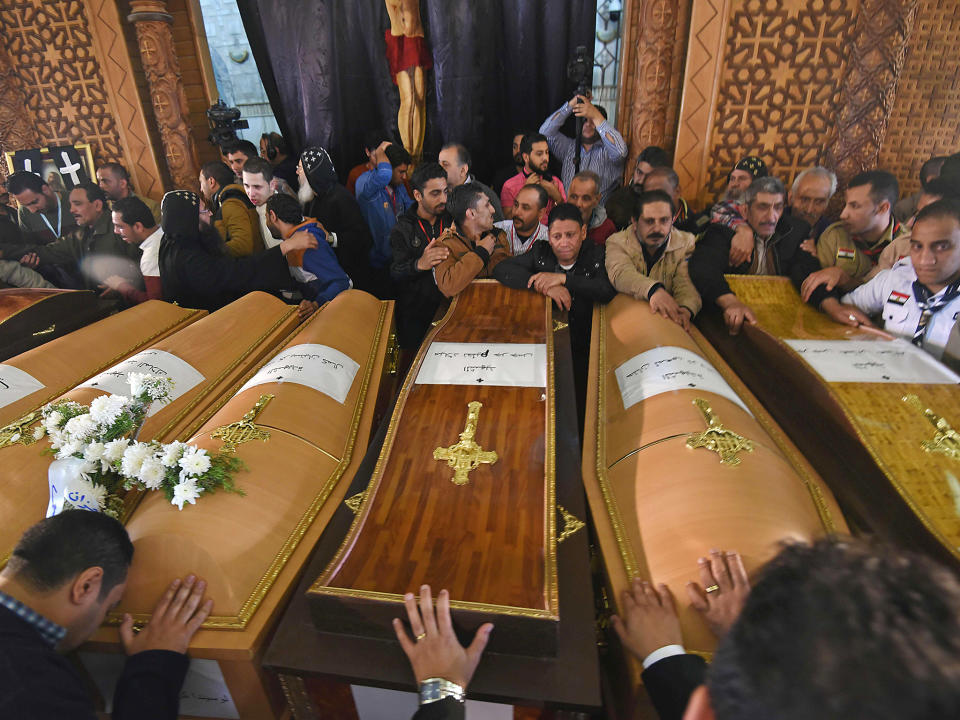The Middle East needs more than a visit from the Pope to stop Isis's genocide of Christians

It’s now a year since UK Parliament unanimously voted to declare Isis violence against Christians and other ethnic minorities in the Middle East as genocide – and yet these crimes against humanity continue unchallenged due to the perceived inactiveness of world leaders — from 10 Downing Street to the White House, the Kremlin, the Elysee and the United Nations.
Just this month, we saw Isis suicide bombers cause unimaginable scenes of horror at two Coptic Christian churches in Egypt. At least 40 worshippers celebrating Palm Sunday were killed and more than 100 injured in the attack. It was the single deadliest day in decades for Egypt’s Christians, and follows a number of violent attacks in the country including the bombing of a church in Cairo which killed 30 people last December. Their only crime? Wishing to practice their faith peacefully, in their own place of worship.
These attacks form only part of a relentless, barbaric war waged by Isis to rid the Middle East of the Christian communities that have thrived in the region since the first century AD. Isis has vowed to systematically kill and persecute Christians in countries from Libya to Iraq, employing tactics that include mass slaughters, beheadings, enslavement, rape, kidnapping, abductions of women and girls, and forced migration. In Iraq, the Christian population has decreased from 1.5 million in 2003 to 200,000 today. If no serious and legitimate action is taken, some experts predict that there will be no Christians in the Middle East within ten years as a result of being either killed or forced to flee persecution.
If Christians in the Middle East are wiped out, responsibility will not only lie with Isis, but with world leaders and others in power who failed to intervene. It is important that this plea not be mistaken as an appeal to just Christians, Jews, Muslims, or even the religious per se, but rather to the humanist, the secular, and most importantly, to the compassionate.
Have we learned nothing from the 1994 genocide in Rwanda, which saw over 800,000 Tutsi killed in less than three months? World leaders vowed that they would never allow such atrocities to happen again, yet now we find ourselves on the precipice of a similar massacre.
UK Parliament’s decision to condemn Isis violence as genocide was bolstered at the same time by support from more than 200 Muslim leaders and heads of state who gathered in Morocco to release the Marrakech Declaration, calling for the protection of religion minorities, including Christians. These institutions failed, however, to support those resolutions with concrete action.
World leaders can no longer afford to hesitate; tough words are not enough. As we have seen with the populist surges in the United Kingdom, France and the United States, and the emergence of far right parties in Italy, France, and Germany, voters will no longer tolerate inaction and the status quo. Leaders who fail to listen and respond will be removed.
To save and protect the Christians of the Middle East, leaders must raise their voices and take swift and aggressive steps to end this crisis.
To achieve this, we must continue to strengthen inter-faith dialogues with Muslim leaders and show solidarity with beleaguered Christian communities in the Middle East. Pope Francis’s trip to Cairo on Friday where he sought to promote messages of peace and strengthen relations with the Muslim community, was a positive step forward. This must be reinforced by other world leaders.
In addition, Middle Eastern governments must significantly increase security for Christian churches, schools, institutions, and neighbourhoods, and Western governments and the UN should provide financial aid to support these efforts. Humanitarian aid should also be directed to Christian communities impacted by Islamic State’s genocide and reconstruction programmes and genocide investigations should take place.
Furthermore, the perpetrators of genocide must be brought to justice in international criminal courts, and we should pursue the possibility of prosecuting former Isis fighters who have fled back to their home countries. We must ensure that those refugees displaced by genocide are provided the security and aid needed to return to their communities and rebuild their economies.
Finally, raising public awareness of this crisis will be crucial to stopping it. Throughout history, we have seen that the outcry of benevolent people, no matter their religion, race, or ethnicity, almost always results in action against those who have committed crimes against humanity. There is no justification, religious or otherwise, for these horrific crimes. We must appeal to the secularist, the humanist, the religious, and anyone who believes that life, a sacred item we know so little about, is by far our most prized possession.
Cécilia Attias is the former First Lady of France, Senior Vice President for Public Affairs of Richard Attias & Associates and founder of the Cécilia Attias Foundation for Women

 Yahoo News
Yahoo News 